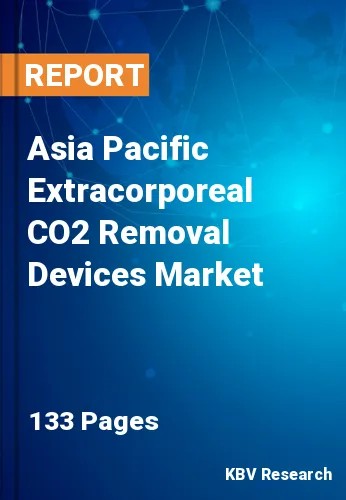The Asia Pacific Extracorporeal CO2 Removal Devices Market would witness market growth of 8.3% CAGR during the forecast period (2023-2030).
Ongoing research and clinical trials have demonstrated the effectiveness of ECCO2R in various patient populations, including those with severe pneumonia, ARDS, and COPD exacerbations. Positive outcomes have encouraged healthcare providers to consider ECCO2R a viable treatment option. Healthcare providers increasingly recognize the importance of lung-protective ventilation strategies to limit ventilator-induced lung injury (VILI). ECCO2R allows for lower tidal volumes and reduced mechanical ventilation settings, aligning with these lung-protective principles. ECCO2R offers a less invasive alternative to conventional mechanical ventilation. It can be used to avoid or delay endotracheal intubation in some cases, reducing the risks associated with invasive ventilation.
ECCO2R provides a specific solution for CO2 removal. ECCO2R can serve as a bridge to recovery for patients with potentially reversible lung injuries or diseases. It allows the lungs to rest and recover while providing essential respiratory support. ECCO2R is used during high-risk surgical procedures to support patients with compromised respiratory function. It helps maintain appropriate oxygenation and CO2 elimination during surgery.
A trend towards smaller and more portable ECCO2R devices has emerged, allowing for greater flexibility in using ECCO2R in various clinical settings, including providing ECCO2R support outside of traditional intensive care units. Some ECCO2R devices are being integrated with extracorporeal membrane oxygenation (ECMO) systems to support CO2 removal and oxygenation. These hybrid systems offer a comprehensive solution for patients with severe respiratory failure. Advances in membrane technology continue to enhance the efficiency of CO2 removal and gas exchange in ECCO2R devices.
Rapid urbanization in India has led to changes in living conditions, including overcrowding and inadequate sanitation, which can contribute to respiratory infections. Many cities and regions in India experience severe air pollution due to industrial emissions, vehicular traffic, construction activities, and agricultural practices, which cause respiratory diseases. Therefore, the region will present lucrative growth opportunities for the development of the market.
The China market dominated the Asia Pacific Extracorporeal CO2 Removal Devices Market, By Country in 2022, and would continue to be a dominant market till 2030; thereby, achieving a market value of $9,732.2 Thousands by 2030. The Japan market is registering a CAGR of 7.6% during (2023 - 2030). Additionally, The India market would showcase a CAGR of 8.9% during (2023 - 2030).
Based on Application, the market is segmented into Bridge to Lung Transplant, Chronic Obstructive Pulmonary Disease (COPD), Acute Respiratory Distress Syndrome (ARDS), and Others. Based on End-Use, the market is segmented into Hospitals, Clinics, Ambulatory Surgical Centers, and Others. Based on Product, the market is segmented into Extracorporeal CO2 Machines, Disposables, and Others. Based on Access, the market is segmented into Arteriovenous & Venovenous. Based on countries, the market is segmented into China, Japan, India, South Korea, Singapore, Malaysia, and Rest of Asia Pacific.
Free Valuable Insights: The Global Extracorporeal CO2 Removal Devices Market is Predict to reach $132.8 Million by 2030, at a CAGR of 7.3%
The market research report covers the analysis of key stake holders of the market. Key companies profiled in the report include Medtronic PLC, Getinge AB, Fresenius Medical Care AG & Co. KGaA , Medica S.P.A., Aferetica srl, LivaNova PLC, ESTOR S.P.A., X-COR Therapeutics
By Application
By End-Use
By Product
By Access
By Country
Our team of dedicated experts can provide you with attractive expansion opportunities for your business.

